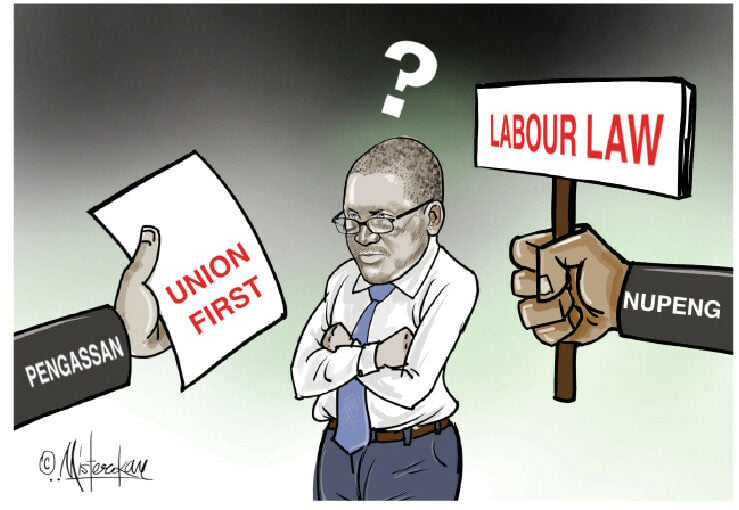By Abdulrauf Aliyu
Copyright leadership

Nigeria has always lived with the drama of oil. From the first gush of crude in Oloibiri to the unending fuel queues that mark our daily lives, oil is less a resource than a stage where power, politics, and survival collide. Now the latest act unfolds not in a government office or an offshore rig, but in the shimmering new Dangote Refinery, the private sector’s audacious attempt to redraw the nation’s energy map. Instead of unity around national pride, we have confrontation. Instead of shared purpose, we have discord. The refinery has become less a factory and more a mirror, reflecting the age-old struggle between labour and capital in Nigeria.
The conflict pits refinery management against the oil and gas unions, PENGASSAN and NUPENG. Management seeks control, wary of organized labour’s reach. The unions demand recognition, invoking constitutional rights and decades of tradition. Each side claims principle, but both betray rigidity. And somewhere between these immovable positions, Nigeria’s greatest industrial project risks being reduced to a story of mistrust and missed opportunity.
The Managers Who Fear Shadows
One can almost sympathize with the refinery’s managers. They preside over a facility the size of a small city, financed at extraordinary cost, carrying the hopes of a nation and the reputation of its most famous businessman. The specter of strikes, stoppages, or political entanglements is terrifying. To them, every union demand looks like the thin edge of a wedge. Recognize PENGASSAN today and tomorrow they may face walkouts timed to exploit national fuel shortages.
Yet fear is a poor substitute for strategy. By treating union recognition as a concession rather than a constitutional inevitability, management damages its own legitimacy. Authority in Nigeria’s industrial landscape cannot survive without legitimacy. When workers sense hostility to their rights, when courts frown at evasions, when the public sympathizes with the underdog, authority becomes brittle. The attempt to preserve control ends up eroding it. It is an old Nigerian habit: to rule with power while ignoring perception. It has rarely ended well.
The Unions Who Mistake Muscle for Magnetism
If management suffers from anxiety, the unions suffer from overconfidence. For PENGASSAN and NUPENG, the refinery is too strategic to be left alone. They see recognition not as negotiation but as destiny. In their telling, every worker must belong, every refinery must be organized, and every employer must bow to the structures that have defined labour relations for decades.
The unions forget that legitimacy thrives on choice, not compulsion. When they insist that every worker must join, they reduce a constitutional right to an obligation. Younger employees, shaped by a new labour market and less enamoured of old solidarities, may see the unions less as protectors than as gatekeepers. Management, instead of perceiving partners, sees rivals. By mistaking muscle for magnetism, the unions risk alienating the very constituency they claim to defend. Influence must be earned, not demanded.
Industrial Relations Beyond the Factory Gates
The fight is not confined to the refinery grounds. It plays out in Nigeria’s nonmarket environment, where law, politics, and public perception hold as much sway as balance sheets. The refinery’s managers craft careful press releases about restructuring. The unions mobilize statements about anti-labour practices. Regulators are pulled in, security services hover at the margins, and the courts wait to adjudicate. And in the background looms the Nigerian public, weary of disruptions in fuel supply but instinctively sympathetic to the language of workers’ rights.
This is the terrain of nonmarket strategy, where actors compete not only for immediate advantage but for narrative dominance. A company can win a legal battle yet lose legitimacy in the public square. A union can stage a successful strike yet forfeit goodwill if hardship spreads to consumers. Both management and labour have miscalculated by assuming that the refinery is a closed system. It is not. It is a theatre where every gesture echoes far beyond the gates of Lekki.
History’s Persistent Warnings
Nigeria has seen this movie before. In the late 1970s, the state sought to rein in oil workers who, emboldened by newfound petro-power, demanded greater recognition and benefits. The government responded with force, dismissals, and decrees. The unions countered with crippling strikes that shook the economy and forced reversals. Authority asserted without legitimacy collapsed. Nigeria learned, painfully, that workers denied voice will eventually find ways to roar.
Contrast that with Germany after the Second World War. Scarred by conflict, determined to build a stable economy, German industrialists and unions agreed on co-determination: workers would have a voice not only in wages but in governance. Works councils and supervisory boards institutionalized legitimacy. Management kept authority, unions gained recognition, and the system produced decades of industrial peace. German factories did not crumble under union weight; they became Europe’s industrial backbone.
The lessons are clear. Nigeria’s refinery cannot be governed by fear, nor can it be organized by fiat. Exclusion breeds revolt, compulsion breeds resentment. Legitimacy and authority must walk together or not at all.
The Folly of Rigidity
The tragedy of the Dangote dispute is not that both sides are wrong, but that both refuse to bend. Management imagines that avoiding recognition will shield operations. The unions imagine that insisting on compulsory membership will secure loyalty. Both misread the environment. Authority without legitimacy invites rebellion. Legitimacy without flexibility collapses into irrelevance.
Rigidity narrows the path to compromise. It transforms what could be a dialogue into a test of strength, and what could be a partnership into a zero-sum game. The refinery – conceived as a national asset – becomes hostage to personal calculations. It is an irony Nigeria knows too well: the bigger the project, the pettier the quarrels.
Toward a Smarter Engagement
There is another path. Management could embrace recognition as a strategic tool, not a concession. A unionized workforce is not necessarily a rebellious one; it can be a stabilizing force if channeled through structured dialogue. A recognized union gives management a partner to negotiate with rather than a shadow to fear. It signals respect for the law, reassures regulators, and builds credibility at home and abroad. Authority fortified by legitimacy is stronger, not weaker.
The unions could reinvent themselves by focusing less on compulsion and more on value. Instead of demanding membership as tribute, they could prove their worth through advocacy for safety, transparent grievance mechanisms, and genuine career progression. When workers see tangible benefits, membership grows naturally. Influence built on service outlasts influence built on threats.
The state too has a role. It cannot continue to oscillate between indifference and heavy-handedness. Clear, consistent enforcement of labour laws, applied even to the most powerful corporations, is not optional. It is the foundation of an investment climate that values both productivity and fairness.
The Dangote Refinery was billed as the crown jewel of Nigeria’s industrial future. Whether it shines or tarnishes will depend less on engineering and finance than on the country’s capacity to manage labour relations with wisdom rather than bravado. A project this monumental cannot afford to be reduced to a tug-of-war between suspicion and insistence. If labour and management can find common ground, the refinery might finally symbolize what it was built to represent: the possibility of a Nigeria that works.



